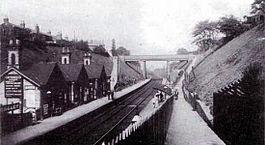Richard Lutz reports on a step forward in opening the Moseley/Kings Heath train line.

Plans to build two railway stations in south Birmingham have been submitted to re-open the Camp Hill line to passenger services.
The stations at Kings Heath and Hazelwell have been shut for eighty years but they are set to be rebuilt and the line reopened to commuters. It’s considered a major step forward in the campaign to get improved rail services in the south of the city.

Moseley station back in the day
Plans for a third station at Moseley are undergoing further design work and will be submitted to the city council later in the year, say rail planners.
The new Hazelwell Station will include platforms with a canopy, stairs and lifts and a forecourt drop off/pick up area outside. Covered cycle storage will be provided and lighting and CCTV installed.
Nearby Kings Heath Station plans are similar. They also include platforms with a canopy, lift and stair access plus cycle storage. Space will also be set aside for a possible future additional station building.
There will also be space for public art or a heritage display to reflect the history of the area and a direct walkway into Highbury Park, say the designers.
Mayor Andy Street said: “I am confident that we can have these stations open and the Camp Hill line back up and running by 2021.”
The stations closed in 1941, since when the line has been used only by freight and non-stop services.
There was no mention of re-opening a station in Balsall Heath, which could lead to political ramifications.
Issues still being considered include the speed and frequency of the trains, what happens to freight usage, price of tickets and whether the route will ultimately link up with other major lines at Kings Norton. One major problem that had to be tackled was how to re open the former rail junction at the Camp Hill roundabout to get trains in and out of the city centre. he problem now seemingly has been overcome.
Transport for the West Midlands and the West Midlands Rail Executive along with rail industry partners including Network Rail and West Midlands Trains are leading the development of the new stations.